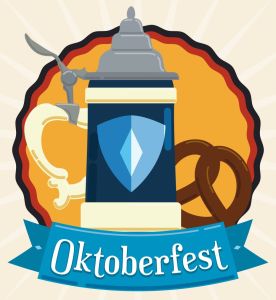The Brewtiful Tradition

As the leaves turn golden and the crisp autumn breeze fills the air, people all over the world look forward to a spirited celebration known as Oktoberfest. This 16 to 18-day festival held annually in Munich, Germany, is a time for revelry, traditional Bavarian food, and, of course, copious amounts of beer. But have you ever wondered why Oktoberfest is celebrated and what’s the connection between it and the craft beer movement? In this blog post, we’ll take you on a journey through the history and significance of Oktoberfest and explore how it has influenced the craft beer scene.
The Origins of Oktoberfest
Oktoberfest, or “Wiesn” as the locals call it, has a rich history that dates back to 1810. The first Oktoberfest was held in Munich to celebrate the October 12th wedding of Crown Prince Ludwig (who later became King Ludwig I) and Princess Therese of Saxony-Hildburghausen. The citizens of Munich were invited to join in the festivities. These included horse races, parades, and, of course, copious amounts of beer. The celebrations were such a hit that they were repeated the following year, and thus, a tradition was born.
Today, Oktoberfest has evolved into the world’s largest beer festival, attracting millions of visitors from around the globe. While it has retained its Bavarian roots, it has also become a global celebration of beer, food, and culture.
The Beer of Oktoberfest
Oktoberfest and beer are inextricably linked. The festival officially kicks off when the mayor of Munich taps the first keg, exclaiming “O’zapft is!” (It’s tapped!). Traditionally, Oktoberfest beer is a Märzen, a lager that is brewed in March and stored in cool cellars to be enjoyed in the fall. This amber-hued beer is known for its rich, malty flavor and a slightly higher alcohol content than your average lager.
Six Munich breweries are allowed to participate in Oktoberfest and serve their brews at the festival: Augustiner-Bräu, Hacker-Pschorr, Löwenbräu, Paulaner, Spaten, and Hofbräu. Each brewery crafts its own unique Märzen, resulting in a delightful array of flavor profiles for festival-goers to savor.
The Craft Beer Connection
So, what does all of this have to do with the craft beer movement? In recent years, craft brewers worldwide have embraced the Oktoberfest style, paying homage to its rich traditions while putting their own spin on it. Here are a few key ways in which Oktoberfest has influenced the craft beer scene:
Seasonal Brews
Just as Märzen beer is brewed in March and enjoyed in the fall, craft brewers have adopted this seasonal approach. Many craft breweries release their own Oktoberfest-style beers in late summer or early fall, often with creative twists that reflect their unique brewing styles.
Flavor Innovation
Craft brewers are known for pushing the boundaries of flavor. While traditional Märzen beers are rich and malty, craft brewers have experimented with different ingredients and techniques to create unique variations, from pumpkin-spiced Märzen to barrel-aged interpretations.
Celebrating Tradition
Oktoberfest is not just about beer; it’s a celebration of Bavarian culture. Many craft breweries host their own Oktoberfest-themed events, complete with traditional music, food, and, of course, beer. These celebrations help introduce more people to the culture and history behind Oktoberfest.
Collaborations
Craft breweries often collaborate with one another or with traditional German breweries to create unique Oktoberfest beers. These collaborations bring together the best of both worlds, resulting in delicious and diverse brews.
Oktoberfest is more than just a beer festival; it’s a celebration of tradition, culture, and the art of brewing. Its influence on the craft beer movement is a testament to the enduring appeal of this time-honored event. As we raise our steins and prost to another Oktoberfest, let’s remember the rich history and the evolving world of craft beer that make this celebration truly brewtiful.